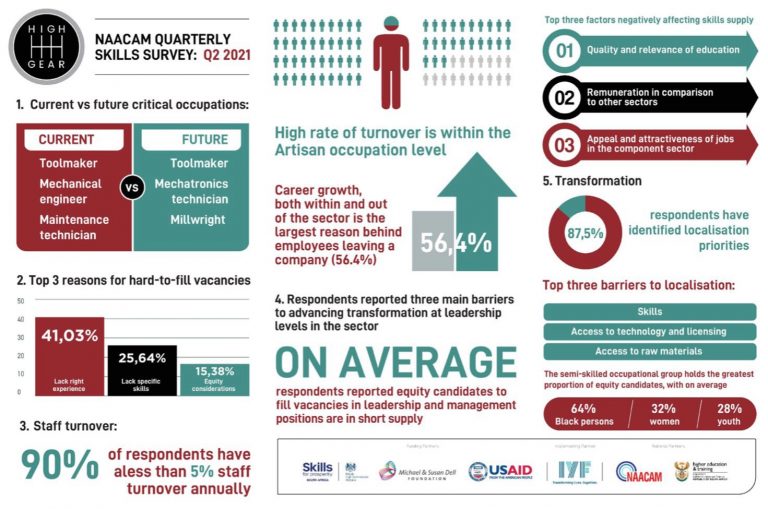The nature of automotive manufacturing is changing at a rapid pace. Fundamental changes in manufacturing processes and methodologies, quality management, materials management and supply chain logistics have created increasing pressure for automotive component suppliers to rapidly identify and embed critical skills to secure their global competitiveness.
These are the findings in the High Gear second Quarterly Skills Survey, which sought to understand the nature of occupational skills gaps in the component sector and determine the potential impact on the supply base and the overall competitiveness of the sector.
The survey found that ‘Hard-to-fill’ vacancies (HTFVs) are prevalent in the supply base, with 90% of respondents reporting at least one occurrence of these vacancies in the last six months. The survey found that whilst respondents anticipate changes in what the merSETA reports as critical occupations in the future, toolmakers are ranked the top critical hard-tofill occupation based on current vacancies in the sector. It is likely that this will endure into the future.
Component suppliers noted the lack of appropriate experience and skills as the main drivers behind the numerous hard-to-fill vacancies in the sector. Additionally, component manufacturers on average have a low staff turnover rate, which implies a less ‘fluid’ pool of potential new candidates which contributes to the shortage of experienced individuals available in the market.
A lack of adequate skills supply is also creating a bottleneck to companies’ transformation and localisation objectives. Respondents noted the need for greater representation of employment equity candidates, especially youth and women, across all occupation levels. A skilled pipeline of candidates is, however, limited partially due to the quality of education, and remuneration offered in the sector, which often sees high calibre individuals entering other industrial sectors.
High Gear’s Programme Director, Colin Hagans, emphasises that TVET colleges have an important role in reducing hard-to-fill vacancies: “Through industry partnerships facilitated by High Gear, the TVET college system is well-placed to develop a more reliable pipeline of graduates with the key foundational technical and life skills required by industry.”
“This can be an effective strategy for addressing scarce skills and advancing transformation, including at more advanced occupational levels, as a pipeline of highly-competent and motivated young people are better positioned to advance through the ranks,” he adds.
Positively, recognising the South African Automotive Masterplan (SAAM2035) objective of 60% local content by 2035, just less than 90% of NAACAM members have identified localisation priorities, which they seek to support. Whilst many companies have localisation objectives and leverage multiple avenues of support, including industry-lead initiatives, tangibly there has been minimal improvement seen in the overall percentage of local content in recent years (some of this may be attributed to the previous incentive framework).
NAACAM members agree that the lack of appropriate skills, technical competencies and access to proprietary global technology as their most significant hindrances to deeper localisation amongst their tier 2 and 3 supplier base.
Respondents overwhelmingly pointed to the need to tackle skills development and experience in potential candidates looking to fill critical roles, as well as promote the attractiveness of the industry to encourage skilled individuals to enter the component sector.
The survey adds that the prominence of tool making as a critical occupation both currently and in the future provides a clear directive that interventions need to place some focus on developing the pipeline of skilled toolmakers entering the sector.
To this end, High Gear says it is taking steps to create a demand-driven TVET system that offers quality courses that are aligned with industry: Develop an enhanced demand-driven TVET system through industry-informed course upgrades, lecturer training and expanded workplace exposure for both students and lecturers.
Create an online ‘career experience platform’ to provide students with sound career guidance regarding jobs in the industry and promote ‘attractiveness’ of the component sector. In alignment with the findings of the HTFVs in the sector, High Gear is focusing on profiling numerous HTFVs on the online careers experience platform, so that young jobseekers may have a more robust understanding of the opportunities pathways in the sector and the key competencies required to access and succeed in these roles.


